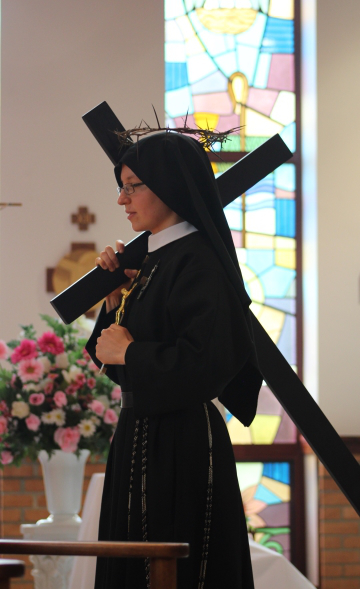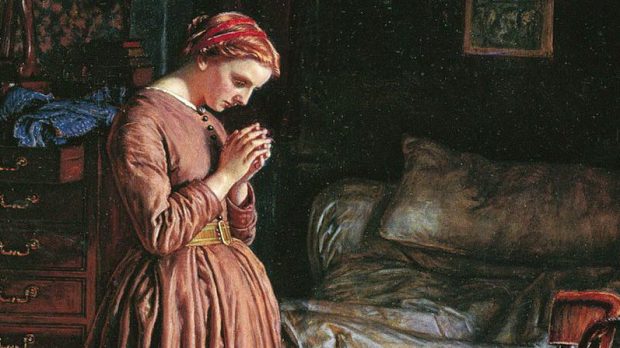Lenten Campaign 2025
This content is free of charge, as are all our articles.
Support us with a donation that is tax-deductible and enable us to continue to reach millions of readers.
In 2014, Matthew Wenke and his wife watched as their daughter, Nora, walked into a Passionist Monastery in Kentucky to try her vocation as a religious.
As the doors closed behind the young woman, her family knew that should she persevere Nora would never again grace their own home with her presence. Besides taking the usual vows — poverty, chastity, and obedience — Passionist nuns take a fourth vow of “enclosure.”
Wenke, though proud of his daughter and happy for her joy, as all parents are for their children — nevertheless needed time to process the event because, as he wrote, “When I prayed for vocations, I didn’t mean God could have my daughter!”
There is the old, true chestnut, of course, “Be careful what you pray for; you might get it.” How often do we hedge our prayers — we say the first “dangerous” prayer (“Thy will be done”), but we hope we can get the glory we seek without having to encounter the Cross. I know I do it all the time: “Dear God, please teach me how to be a better person. Thy will be done, but don’t do it some crazy way, that involves something tragic, okay? I can’t handle it.”
So often, my prayers take a line through Flannery O’ Connor: “Lord, I’ll never be a saint but I might be a martyr if they can kill me quickly!”
We want all the blessings we can get, preferably with as little suffering as possible, please and thank you! We think, “Please don’t wreck my life!”
Actually, that is the second “dangerous prayer.” In a recent interview with Aleteia, a young Dominican nun revealed that a speaker at a Catholic youth conference had dared attendees to pray “O God, ruin my life!” She took the dare. The religious life hadn’t been anywhere on her radar but once she made that audacious, dangerous prayer her whole world and outlook changed within months.
The third dangerous prayer, though, is one that Fr. Brad Milunski, OFM, Conv. brought up in his homily during the First Profession of Sr. Frances Marie of the Eucharistic Heart of Jesus, CP. Yes, that would be Matt Wenke’s daughter, who is progressing in her enclosure. Pictures here.
In Fr. Milunski’s homily, the priest admits that it is an intrepid prayer — “Lord, make me yours…”:
When I was a friar-priest beginning parish ministry, I was fortunate to have been stationed near a monastery of Poor Clare nuns in New Jersey … the abbess became my spiritual director and shared with me one day that as of late her one prayer to God had become simply this: “Make me yours.” I must confess that I went back to the friary a bit frightened by that prayer. I was also a bit upset with myself that I couldn’t yet offer that same prayer without offering God my own list of footnotes. “Make me yours,” I could say, “but here are my suggestions, Lord, as to how you might go about that.” Maybe it’s a guy thing, but I suspect not.
The homily is really quite good, and it deserves a full and attentive read.
And ponder it a bit, as I have been pondering it. I barely have the courage to say “Your will, not mine,” even though I know I am in control of so little, even though I believe — with my whole heart, because I am true daughter of St. Philip Neri — that “All of God’s purposes are to the good; although we may not always understand this we can trust in it.”
I believe it because I have seen in my own life how things that were tragic and senseless and life-altering — things I wanted no part of — ended up serving a plan so much bigger than anything I might have dreamt.
We look at people like St. John Paul, and St. Teresa of Calcutta — people who at some point made their dangerous prayers to God, saying “Use me, and use me up,” and were eventually used unto embers.
In the mysterious cartography of obedience, “Thar be heaven, and glory with the saints and the angels.”
But only if we are not afraid of these dangerous prayers of blessing.


